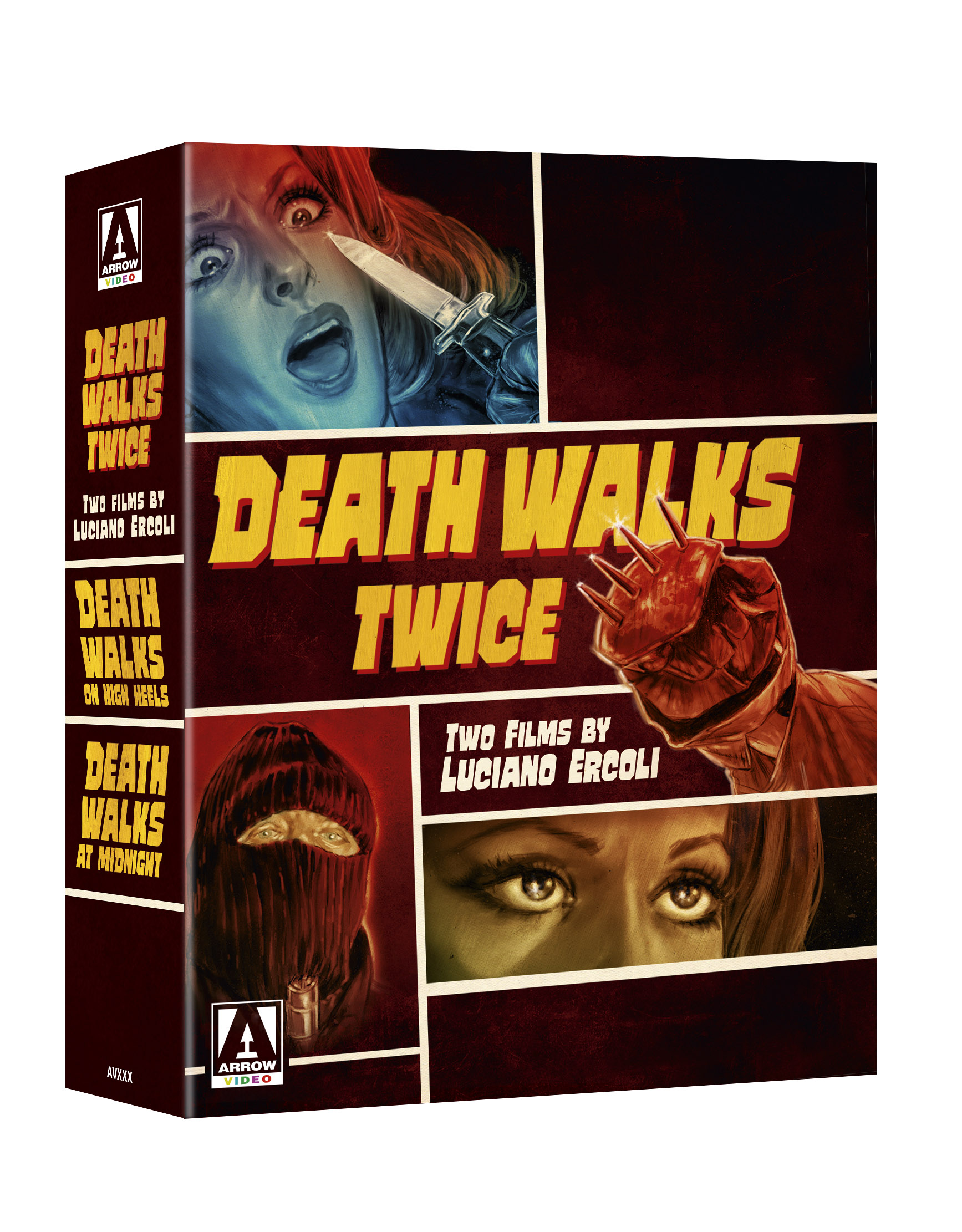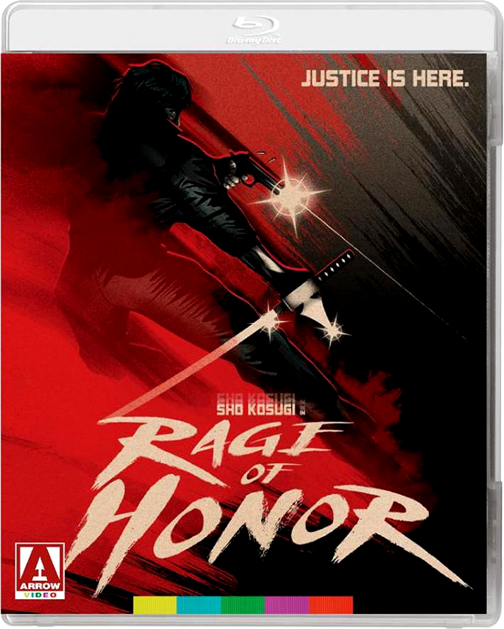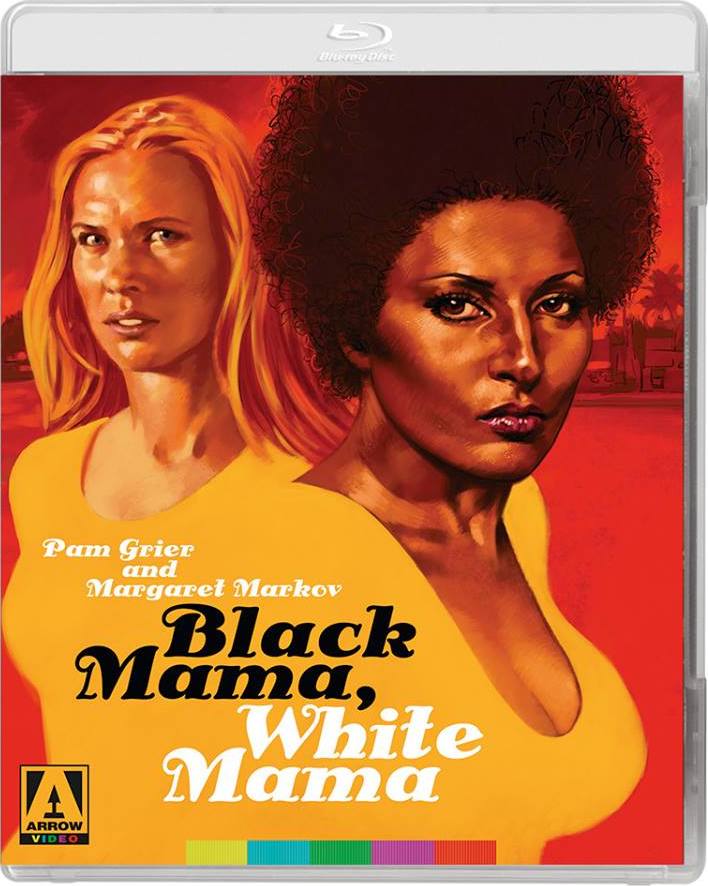Now On Blu-ray: DEATH WALKS TWICE, RAGE OF HONOR, BLACK MAMA, WHITE MAMA From Arrow Video
Let's take a look at some of the latest April 2016 releases from Arrow Video USA!



Arrow Video began it's life six years ago as a sub-label of Arrow Films designed to showcase the Italian giallo film with releases of classic films from Dario Argento. In the years since they have certainly diversified their offerings, but have stayed true to their original intentions with releases of films like Sergio Martino's Your Vice is a Locked Room and Only I Have the Key and Massimo Dallamano's What Have You Done to Solange?, along with reissues of Argento's Deep Red. The latest addition to their giallo collection is a highly regarded pair of films from Luciano Ercoli, Death Walks on High Heels and Death Walks at Midnight, a pair of thrillers starring Spanish beauty Nieves Navarro. Long out of print on DVD from No Shame, Arrow's new releases really make up for lost time be providing essential pieces in the ever unfolding giallo home video puzzle.
In Death Walks on High Heels, Navarro plays a stripper/model who also happens to be the daughter of a jewel thief who dies mysteriously at the hands of a black gloved fiend. Over the course of the film, we're treated to numerous twists and turns that leave the viewer in a tizzy trying to discover the identity of the stalker determined to recover the late thief's ultimate haul. Navarro plays it cool while her co-stars fumble for clues in an mystery for which no reasonable conclusion can be found.
High Heels is a fun little giallo film that borrows tropes from better known (and objectively better) films like Psycho in disposing of its heroine early on. However, the chase is most definitely better than the catch in this case. Ercoli's direction combined with a decent morbidly amusing script from Italian giallo master Ernesto Gastaldi, makes for an interesting and fun ride. Beautifully framed violence and a lovely score from Stelvio Cipriani add to the appeal of High Heels as one of the more solid entries in the deliriously overstuffed giallo oeuvre.
Ercoli's follow up, Death Walks at Midnight, is a bit more engaging, though certainly more of its time than High Heels. In this film, Navarro plays a supermodel who witnesses a murder while in the midst of a hallucinogenic haze. When the cops and her own love interest have trouble believing her, she jumps in to solve the crime, but at what cost? This popular Rear Window-esque plot served as the starting point for many a giallo, including the genre's widely accepted first entry, Mario Bava's The Girl Who Knew Too Much, but Ercoli spices it up compared to that entry from a decade before with plenty of sex and bloody violence.
Nieves Navarro is eminently watchable in these films, even when the film abandons her, she's still the most exciting this about the proceedings. Much like Soledad Miranda or Lina Romay for Jess Franco's early '70s adventures, Navarro truly was Ercoli's muse. Unlike Franco's girls, Navarro had a sense of belonging on the screen, perhaps due to her “mature” age, she was in her early thirties by the time they started. Whatever the reason, Navarro, Ercoli, and screenwriter Gastaldi created a potent mix of sex and violence that makes these films stand out in a genre with hundreds of entries over a very brief lifespan.
The Disc:
Arrow Video pulled out all the stops for their Death Walks Twice box set. Both films look gorgeous in their Blu-ray upgrades. The prints are quite clean and colorful without any sign of digital over-manipulation. There is the occasional print damage, but the scratches are minimal and don't adversely affect the viewing experience. Audio tracks are provided in both the original Italian and English language dubs with English subtitles available on demand. Also available on both films are audio commentary tracks by Tim Lucas, the Video Watchdog editor is well-informed and exceptionally well prepared for these tracks, and while his tracks may feel a little dry at times, they are packed to the brim with information on each film and its place in Italian film history.
If that were all the package offered, it would be stellar, but the package contains a lot more supplemental content for fans to peruse. We get a career retrospective interview with High Heels composer Stelvio Cipriani, one of Italy's most famous composers, as well as Ernesto Gastaldi talking about writing these and many other classics. Gastaldi also offers introductions for each film on their respective discs.
There is a wonderful featurette titled From Spain With Love that features interview footage from both Navarro and Ercoli exploring their collaborations on film and behind the scenes. In addition to this exploration of their work, historian Michael Mackenzie offers up a visual essay on their film history on the Midnight disc that is as fascinating as anything in this package. Wrapping it up we have a sixty page booklet with writing on each film from giallo expert Troy Howarth and Danny Shipka.
Death Walks Twice is a must own for any giallo fan. The films look gorgeous, and there are mountains of contextualizing bonus features in the set that makes it a crime to miss this one. Highly recommended!
Kosugi Sho blew the doors off of the action van with his amazing go-for-broke performance in Gordon Hessler's Pray for Death in 1985. It was inevitable that he'd return to the lead for another action film, and it happened only two years later with 1987's Rage of Honor. This time around Shiro (Kosugi) is an American cop looking to take down a drug dealer in Florida. After his best bro is tortured and murdered by the conspicuously effeminate Havlock, the mission gets personal and Shiro goes on a rampage to take him and his entire operation down.
Whereas Pray For Death was most definitely a film that fit into the mid '80s ninja boom, Rage of Honor strays from that formula and instead attempts to emulate the late '80s low budget action genre. After massive successes from acting imports like Arnold Schwarzenegger and Dolph Lundgren, Kosugi was the one major Asian performer to whom the Cannon Group hitched their horse, and unfortunately the result was less outrageous and engaging than Pray for Death.
By 1987, the US was in the grips of Crockett and Tubbs fever, and Miami Vice's pastel influence was on display everywhere. Rage of Honor was not exempt, and the buddy cop stylings sadly left something to be desired, largely due to the fact that Kosugi's buddy is killed off in the first reel. Without a buddy to bounce off of, Kosugi lone wolf performance missed the mark a bit, and Hessler's unwillingness to rely on his martial arts background left Kosugi out to dry. Don't get me wrong, there are some great action sequences in the film, but it really feels the absence of Kosugi's specialty.
However, as the film was shot in the throes of the mid '80s conservative Reagan era action boom, the same jingoistic tone that helped propel films like Commando to success are on display here. In this case it takes the form of a journey to South America to bust up a drug ring. This logically unnecessary excursion provides for one of the most ridiculous sequences in '80s action cinema when Kosugi single-handedly eliminates an entire Amazonian indigenous tribe attempting to defend their jungle. There is no logical reason for this tribe to attack, but they do so anyway, and Shiro's overblown and explosive response to his attackers is par for the course in terms of right wing shoot-first-ask-questions-later action cinema.
Rage of Honor may miss the mark in terms of exotic ninja action, but it's mostly satisfying in terms of the low budget action canon of the time. Kosugi's skills are mostly wasted, and he's hung out to dry in terms of a script that works for his talents, but there are enough gun shots and explosions to sate the average action film fan. Perhaps Kosugi was over exploiting his race and background to make a film work, but I expect that it was more in the hands of the powers that be believing the ninja boom to have extinguished. In any case, this was one of Kosugi's last leading roles and it's a shame for all of us that he left on this unsatisfying note. He mentions a comeback in the bonus features, and I sincerely hope that comes true because he's a talented performer given good material.
The Disc:
Like Pray for Death before it, Rage of Honor looks fantastic in this new HD transfer from MGM and Arrow Video. The image is nearly spotless and its appearance belies its age to a large degree. The audio, while not flashy, is also effective and full, in spite of only sporting the original mono track. There are no notable drop outs and no unnecessary noise. Overall a very satisfying A/V presentation.
Arrow Video provides a conclusion to the career spanning interview with Kosugi begun on the Pray for Death disc, and he proves to be an entertaining and affable interview subject. He talks about his later career and hopes for the future comeback after a supporting role in 2009's Ninja Assassin. He talks about his children, and specifically Kane, who has followed in his footsteps making a splash in martial arts films. Overall, the interview is very engaging, and Arrow Video and producer Edwin Samuelson deserve recognition for landing this meeting with Kosugi who hasn't sat for an interview in a long time. Also present is Chris Poggiali to talk about the rush of American ninja films in the eighties. Poggiali discusses the beginning of the trend with Franco Nero's Enter the Ninja all the way through the bitter end, not afraid to mention the fact that many of these films were duds. Rounding out the extras are an interview with composer at large Stelvio Cipriani and a booklet featuring new writing from Derek Botelho as well as an excerpt from Kosugi's forthcoming book, Yin-Yang Code: The Drums of Tenkai-Bo. A wonderfully complete package that is at least as good as the film for which it has been compiled.
A month ago Arrow Video released the finale of Pam Grier's AIP trilogy, Sheba, Baby, on Blu-ray. While the film itself leaves a bit to be desired, the presentation was top notch and left me excited for more. When the announcement came that they'd follow up with her pre-solo lead Filipino action bonanza Black Mama, White Mama, I couldn't have been more excited. This release of Filipino workhorse Eddie Romero's final island set Grier project is definitely worth your time and money.
Pam Grier and Margaret Markov (The Arena) star as the titular Black Mama and White Mama in this gender swapped version of Stanley Kramer's The Defiant Ones. Instead of black and white male prisoners escaping from a chain-gang, here we have strong women escaping from their Filipino prison to race toward freedom. Lee (Grier) is a tough hooker while Karen (Markov) is a revolutionary in jail for her beliefs. The two have nothing in common at first, except for a notable distaste for one another, but the chains that bind their wrists soon bring them together emotionally to save each other from what seems like the entire Filipino military trying to take them down.
Black Mama, White Mama features Pam Grier on the cusp of super-stardom, whereas if finds Markov near the end of a career in exploitation films. Together they made one more film, The Arena, before going their separate ways with Markov eventually switching careers and Grier going on to success in American International Pictures films from the mid-seventies. That being said, this film features Grier in one of her feistier performances, all while still embracing her sex bomb persona before she decided to zip up for good with Sheba, Baby.
The action is on par with any of the other Romero/Cirio Santiago Filipino films of the day, but Grier and Markov are really able to sell their performances with a mix of sexuality and confidence that was unusual for female stars of the time. There weren't many women who could or did carry action films in the '70s, certainly not in the English speaking industries, but Grier really held her own while Markov delivered on her histrionic hippie performance enough to balance out the street chick vs. hippie idealist paradigm.
While they don't make the cover art or the vintage promotional material, it's tough to imagine the film being as enjoyable as it is without its supporting cast, and in particular two battling buffoons in the form of Sid Haig and Vic Diaz. Haig is truly the third lead in Black Mama, White Mama and performs miracles with his role as oddly out-of-place cowboy bounty hunter with a wardrobe for the ages. Film fans these days mostly know him as Captain Spaulding from the films of Rob Zombie, but he was a regular on Filipino film sets for AIP pictures and filmmaker Jack Hill. He's got charisma to spare and his performance is definitely one of the selling points. Vic Diaz, on the other hand, has less to do in this film, but his presence as one of the recurring local actors in their Filipino actioners never ceases to make me smile. He's one of the most recognizable faces in exploitation cinema and he always delivers.
Black Mama, White Mama is the kind of film that makes me wish I'd been around in the early '70s frequenting drive-ins, but alas, I've had to discover all of these films in the safety and security of my own home, most of them on worn out VHS tapes. Arrow Video's Blu-ray release is the closest I'll ever come to that experience, and for that I am thankful.
The Disc:
The visual presentation of Black Mama, White Mama may not be revelatory, but it's certainly satisfactory. The film is pretty grainy, and the image only intermittently shows exceptional fine detail, but that is more to do with the original materials than any fault of MGM's original HD master. I'm completely satisfied that the film has never looked better than it does now on Blu-ray, including most likely on the big screen.
Never a company to skimp on bonus features, Arrow Video again brings the thunder with this release. We start off with a scholarly and amusing commentary from Filipino film expert Andrew Leavold (The Search for Weng Weng), which is chock full of information surrounding the film culture of the time in the Philippines. Also included are a part of great interviews with Margaret Markov who has an obvious fondness for her time in the movie business, and Sid Haig, who is always an engaging speaker and a favorite interview subject of mine. Lastly there is a rare interview with pioneering Filipino genre director Eddie Romero that covers a large span of his career as one of the first filmmakers to make horror and action films in the island nation. Romero was aging, but his enthusiasm for the work is obvious and it's a joy to hear him reminisce. Finishing the package is an essay from Arrow contributor Chris Poggiali regarding the finesse and joy of viewing and experiencing Black Mama, White Mama. Overall another winning package from Arrow Video.

More about Rage of HOnor
More about Black Mama, White Mama
Around the Internet
Recent Posts
Now Playing: SCREAM 7 Not So Scary, GHOST ELEPHANTS Not a Myth
Leading Voices in Global Cinema
- Peter Martin, Dallas, Texas
- Managing Editor
- Andrew Mack, Toronto, Canada
- Editor, News
- Ard Vijn, Rotterdam, The Netherlands
- Editor, Europe
- Benjamin Umstead, Los Angeles, California
- Editor, U.S.
- J Hurtado, Dallas, Texas
- Editor, U.S.
- James Marsh, Hong Kong, China
- Editor, Asia
- Michele "Izzy" Galgana, New England
- Editor, U.S.
- Ryland Aldrich, Los Angeles, California
- Editor, Festivals
- Shelagh Rowan-Legg
- Editor, Canada









